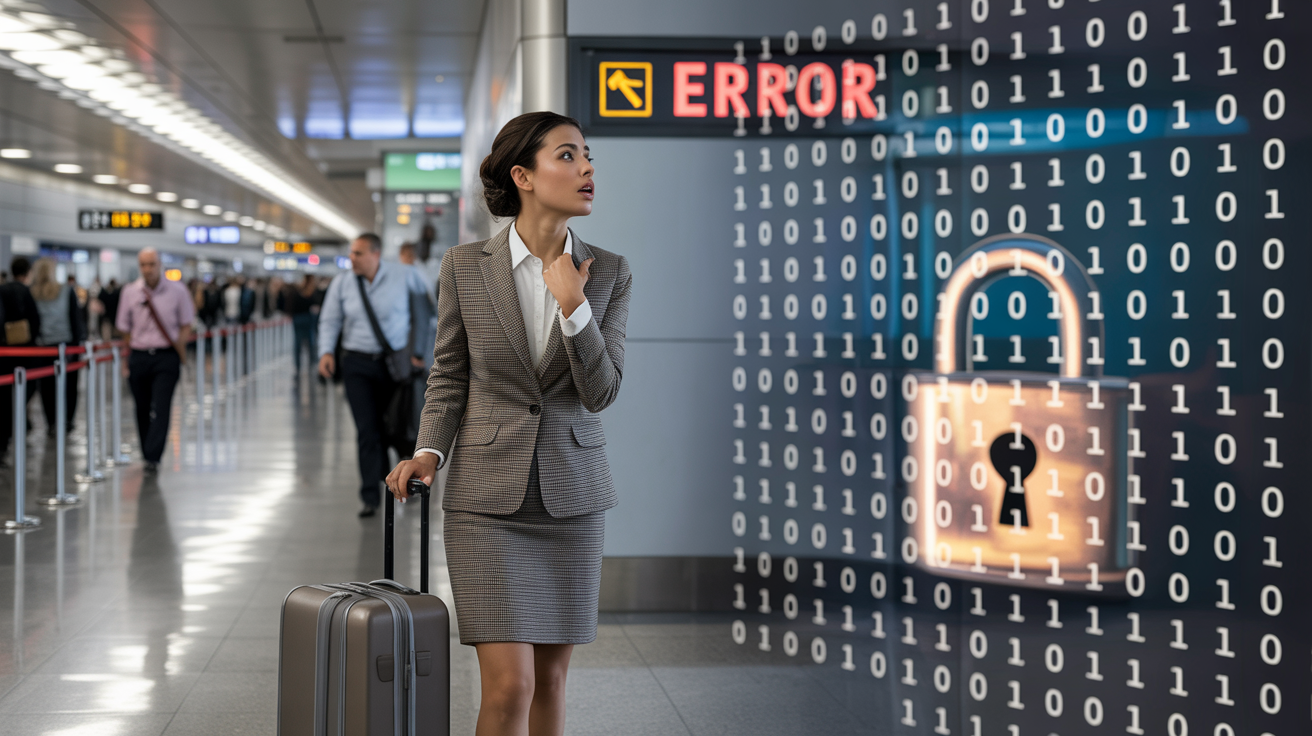🚨 Airport Cyberattack 2025: A Critical Wake-Up Call for Global Cybersecurity
When a Journey Turns Into Digital Chaos
Picture this: you arrive early at Brussels Airport on a Saturday morning. Boarding pass ready, luggage packed, coffee in hand. You expect a smooth journey. But as you walk in, something feels off. The self-check-in kiosks are down. Airline staff are scribbling flight numbers on paper like it’s the 1990s. Departure boards flash confusing messages.
Minutes later, the truth emerges: a massive airport cyberattack has paralyzed multiple European hubs. Hundreds of flights delayed or canceled, thousands of passengers stranded, millions in losses.
This is exactly what happened on September 20, 2025, when airports in Brussels, London Heathrow, and Berlin were crippled by a coordinated cyberattack. This wasn’t just a technical glitch — it was a loud signal that cybersecurity has become a matter of national, corporate, and personal survival.
Table of Contents
1. The September 2025 Airport Cyberattack: What Happened?
The attack targeted Collins Aerospace, provider of the MUSE (Multi-User System Environment) — a system used worldwide for passenger check-in and boarding.
- Self-check-in kiosks went dark.
- Airline agents were forced to revert to manual processing.
- Hundreds of flights were delayed, rerouted, or canceled.
- Passengers missed connections, business meetings, and life events.
👉 Coverage: Al Jazeera – Cyberattack hits check-in systems
The airport cyberattack wasn’t a random act of vandalism. It was a calculated strike on one of the most visible pieces of critical infrastructure in Europe.
2. Storytime: Jean and the Job Interview That Never Happened
Jean, a young DevOps engineer from Brussels and a reader of our partner site CoinDuDev, had been waiting months for his dream interview in London. The flight was booked, preparations done.
But on September 20, Jean found himself stuck in endless lines at Brussels Airport. His flight was first delayed, then canceled due to the airport cyberattack. The interview opportunity — gone.
This story may sound fictional, but it mirrors the lived reality of thousands. Cyberattacks don’t just target data — they disrupt human lives.
3. Why Airports Are Prime Cyber Targets
Airports are the beating heart of global mobility. That makes them highly attractive to cybercriminals.
- Massive media impact: shutting down a major hub guarantees headlines.
- Complete digital dependency: from baggage handling to air traffic control, everything runs on software.
- Economic chain reaction: airlines, logistics, tourism, and trade suffer simultaneously.
An airport cyberattack isn’t just a local inconvenience. It’s a global economic shockwave.
4. How Do Airport Cyberattacks Work?
Hackers exploit vulnerabilities across multiple layers:
- Outdated software not patched in time.
- Phishing emails that trick staff into opening doors for attackers.
- Poor network segmentation, allowing one compromised system to infect the whole infrastructure.
👉 Read more: The Ultimate Guide to Cybersecurity Programming Languages in 2025.
5. Storytime: The Airport Saved by an Ethical Hacker
Back in 2023, a Spanish airport hired an ethical hacker for a penetration test. Within days, he discovered a vulnerability in the baggage system that could have been exploited remotely.
Thanks to this proactive approach, the weakness was patched before attackers could take advantage. The lesson? Cybersecurity professionals are the unseen heroes preventing disasters that never make the news.
6. Preventing the Next Airport Cyberattack
For Companies and Airports
- Establish a Security Operations Center (SOC).
- Keep critical systems updated and patched.
- Run red team/blue team exercises regularly.
- Train every employee to detect phishing attempts.
For Travelers
- Use a VPN on airport Wi-Fi.
- Enable two-factor authentication on all accounts.
- Be skeptical of “airline emails” — many are phishing attempts.
- Save tickets and travel docs both online and offline.
7. Cybersecurity Careers: The Heroes Behind the Firewall
The airport cyberattack proves one thing: we need more cybersecurity professionals. Here are some of the most in-demand roles:
- SOC Analyst: monitors threats 24/7.
- Penetration Tester (Pentester): breaks systems before criminals do.
- Cloud Security Engineer: secures AWS, Azure, and Google Cloud.
- CISO (Chief Information Security Officer): defines global security strategy.
Average Salaries (Europe & North America, 2025)
- SOC Analyst (entry-level): $40k–55k/year
- Pentester (mid-level): $70k–95k/year
- Cloud Security Engineer: $85k–120k/year
- CISO (senior): $140k–220k/year
8. Storytime: Sophie, From Developer to Cyber Guardian
Sophie started her career as a backend developer. Curious about security, she took a certification course. Three years later, she was working at a European airport as part of the cybersecurity team.
One night, she noticed unusual network traffic. Acting quickly, she stopped what turned out to be the start of an intrusion attempt. Her quick thinking may have saved millions of euros and thousands of passengers from chaos.
Her story highlights that cybersecurity is not only lucrative — it’s meaningful work that impacts real lives.
9. The Geopolitics of Airport Cyberattacks
Cyberattacks on airports are rarely just about money. Many are linked to:
- State-backed groups testing digital warfare strategies.
- Transnational criminal networks demanding ransom.
- Hacktivists seeking attention and disruption.
After September 2025, the European Union announced emergency audits, reinforced collaboration with ENISA (European Union Agency for Cybersecurity), and created a dedicated infrastructure protection fund.
The U.S., Canada, and Asia-Pacific nations are also tightening critical infrastructure protection — because airports aren’t just transit points, they are national security assets.
10. What Developers and Tech Teams Must Learn
Every line of code can either strengthen or weaken our defenses. Developers must:
- Adopt security by design principles.
- Integrate automated security testing into CI/CD pipelines.
- Stay up-to-date with new exploits and defense strategies.
11. Building a New Security Culture
The airport cyberattack is a wake-up call:
- Cybersecurity must be seen as an investment, not a cost.
- Every employee — not just IT staff — must be trained to spot threats.
- The public needs awareness campaigns about digital hygiene.
Airports are just the start. Tomorrow it could be power grids, hospitals, or financial systems.
Conclusion: The Next Airport Cyberattack Could Be Yours
The September 2025 airport cyberattack wasn’t an isolated glitch — it was a global wake-up call. Today, cybersecurity isn’t a luxury or a checkbox; it’s a matter of survival.
To strengthen your defenses and build lasting resilience, explore the resources available on CybersecurityInsightX, starting with their Free Cybersecurity Guide 2025.

It’s no longer a question of if airports or other critical systems will be targeted, but when. Preparation is the only real safeguard.





